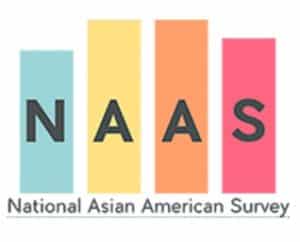
RIVERSIDE, California – Asian American and Pacific Islander voters are an increasingly influential part of the electorate – including in battleground states such as Nevada, Virginia, and North Carolina – and they are leaning more Democratic than they did four years ago.The National Asian American Survey released an important poll this week to shed light on this growing constituency.
The Fall 2016 National Asian American Survey (NAAS) was designed by a team of four researchers: Karthick Ramakrishnan, professor of political science and associate dean of the School of Public Policy at UC Riverside; Janelle Wong, professor of American studies and director of the Asian American Studies Program at the University of Maryland; Taeku Lee, professor of political science and law and associate director of the Haas Institute at UC Berkeley; and Jennifer Lee, Chancellor’s Fellow and professor of sociology at UC Irvine.
A key finding from the 2016 NAAS:
- The Democratic Party advantage among Asian Americans has grown since 2012. The survey team projects that on Election Day Asian American voters will favor Hillary Clinton by 70 percent to 20 percent for Donald Trump. Clinton is on track to match or beat President Obama’s performance in 2012, when he won a record share of the Asian American electorate.
- Native Hawaiians and Pacific Islanders also strongly favor Clinton over Trump, but exhibit more support for Trump than their Asian American counterparts.
The survey was founded in 2008, and repeated in 2012 and 2016. It is a scientific and nonpartisan effort to poll the opinions of Asian Americans and Pacific Islanders, and is the only nationally representative academic survey of the political and social attitudes of this population. The multi-campus team of researchers who conduct the NAAS received grants from the James Irvine Foundation and the Carnegie Corporation to conduct research on civic engagement and policy priorities. A separate $507,132 grant from the National Science Foundation will be used in a subsequent survey to answer important questions about immigrant experiences, race relations, and other social and political attitudes.[xyz-ihs snippet=”adsense-body-ad”]Telephone (landline and cell phone) surveys of 2,238 Asian American and 305 Native Hawaiian/Pacific Islander (NHPI) adults were conducted between Aug. 10 and Sept. 29, and respondents were offered to complete the survey in English or in one of nine Asian ethnic languages. Given that two-thirds of the Asian American population is immigrants—a figure that reaches four-fifths among Asian American adults—offering the survey in languages other than English ensures a more representative sample of the Asian American population than typical surveys.
A report released by the team on Oct. 5 details results from the initial wave of data collection focuses on 1,694 registered Asian Americans and 261 registered NHPIs. Specific Asian groups included Chinese, Asian Indians, Filipinos, Koreans, Vietnamese, Japanese, Hmong, Cambodians, and Native Hawaiian/Pacific Islanders. Additional results focusing on Native Hawaiian and Pacific Islanders will be released in the coming weeks.
Among other key findings of the survey:
- Asian American and NHPI registered voters rank the economy, national security, racism, government, and immigration as the most important problems facing the country.
- Nearly one-quarter (23 percent) of Asian American millennials (between the ages of 18 and 34) state that racism is the most important problem facing the country, and close to three-quarters (72 percent) of all Asian Americans support the government doing more to give blacks equal rights with whites.
- Asian Americans hold progressive views on many policy issues, including health care, education spending, racial justice, and the treatment of Muslim immigrants. But, they are split on allowing Syrian refugees to enter the U.S. and are conservative on legalizing marijuana.
Asked to comment on the report, the researchers had plenty to say. “Donald Trump’s unfavorable ratings are like nothing we have ever seen before among Asian American voters,” Ramakrishnan, of UC Riverside, remarked, referring to comparisons between NAAS election data collected in 2008 and 2012. “It looks like Trump’s rhetoric will jeopardize the Republican National Committee’s efforts since 2013 to reach out to Asian American voters,” he added.
“While Asian Americans evince progressive views on a wide range of social issues, Asian American millennials (age 18-34) and U.S.-born Asians are leading the charge,” said Jennifer Lee, of UC Irvine. They are more likely to support welcoming Syrian refugees, least likely to support a ban on Muslims, and more likely to say that racism is the most important problem facing the country.”
Taeku Lee observed, “In 2016, the relationship of Asian Americans to political parties continues to unfold. Asian Americans overwhelmingly favor Democratic candidates and those who identify with a party are much likelier to affiliate as Democrats than as Republicans. Yet a remarkably high number remain non-partisan.”
“Results from the 2016 National Asian American Survey show that Asian Americans not only care about racial equality,” said Wong,of the University of Maryland, “but a majority also believes that the government has an important role ensuring that blacks gain equal rights with whites.”
The report also suggests that “there is a pressing need for Asian American voter outreach,” given reported lack of contact by parties and candidates. Only 30 percent of Asian American registered voters surveyed said they were contacted by any political party, essentially the same percentage as in 2012. Of those who were contacted, 48 percent of those contacts were from the Democratic Party, 16 percent from the Republican Party, 35 percent from both parties, and 1 percent from a third party.
By comparison, in the 2012 American National Election Study 43 percent of white, 40 percent of African Americans, and 33 percent of Latinos surveyed said they were contacted by a political party. Blacks were more likely to be contacted exclusively by the Democratic Party (60 percent), and whites were more likely to be contacted exclusively by the Republican Party (30 percent).
The growth of the Asian American population and the electorate—especially in battleground states—shows that neither party can afford to continue to ignore America’s fastest growing group.
Source: UCR
[xyz-ihs snippet=”Adversal-468×60″]
